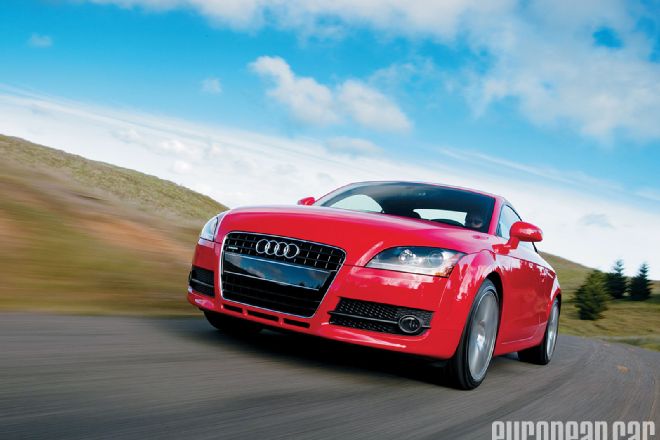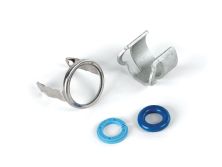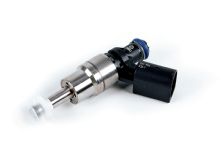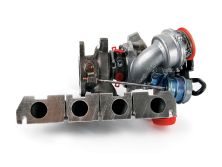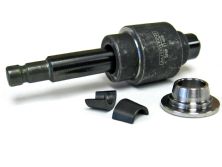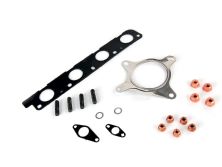The path to gaining power is often riddled with uninformed choices and half-truths that ultimately lead to a dead end, wasting both time and money. This most commonly results from not having an overall game plan from the start or the know-how to see it through.
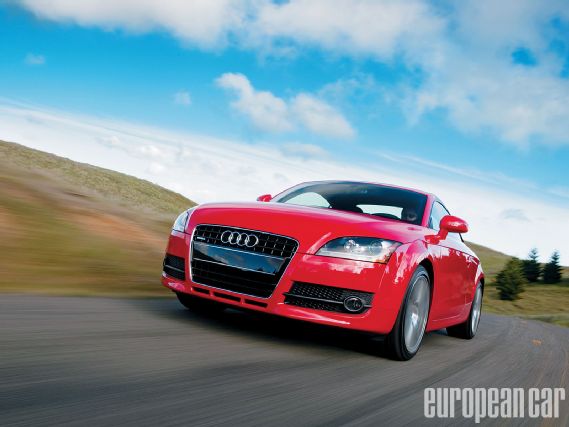 |
2008 Audi TT 2.0T FSI - Proven
|
2008 Audi TT 2.0T FSI - Proven
I recently spoke to an '08 Audi TT owner who wanted to ultimately reach the K04 turbo stage. He figured it would take him two years saving the money to do it all at once. Of course, waiting is never a fun option, so he called around and arrived at the conclusion that an intake would be the first step. But he realized that the K04 turbo required the diverter valve to be relocated, which would necessitate a completely different intake. After extensive research, he hatched a plan that would let him build his way up to a K04 upgrade and minimize wasteful spending. So instead of buying an intake designed for the stock turbo, he bought one for the K04 and capped off the extra hose connection until he needed it. He continued adding parts that were compatible with both the K03 and K04, satisfying his desire to tinker without cleaning out his bank account. This test will demonstrate the difference between fully optimized K03 and K04 setups.
Vehicle Data
Engine: 2.0-liter I4, turbocharged, direct injection
Transmission: Six-speed DSG
Drivetrain: Front Wheel Drive
Mileage: 11,351
Current modifications: Neuspeed P-Chip, Neuspeed 70mm cat-back exhaust, Milltek sport 2.75-inch downpipe w/200-cell catalytic converter, Neuspeed front-mount intercooler, Neuspeed K04 intake, Neuspeed Hi-Flo air charge pipe, OEM S3 DV conversion
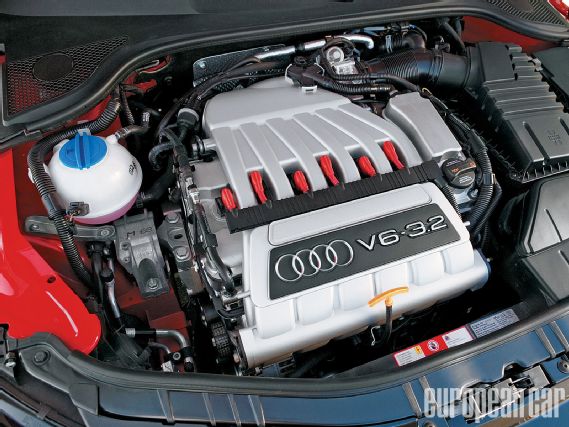 |
2008 Audi TT 2.0T FSI - Proven
|
2008 Audi TT 2.0T FSI - Proven
Dyno Data
Dyno type: Clayton Mustang dynamometer
Transmission test gear: Third
Dyno set weight: 3,300 lb
Fuel grade: 91 octane
Performance
Temperature: 78° F
Humidity: 18%
Peak power: 215 hp @ 5697 rpm
Peak torque: 250 lb-ft @ 3245 rpm
Test Notes
All horsepower and torque numbers are quoted at the wheels. The Mustang dyno, when properly calibrated, produces more accurate horsepower and torque numbers. At first look, these numbers might seem low when compared to a Dynojet (usually 10% or more) or a test in fourth gear. However, it is the difference between the experimental runs and baseline that prove or disprove the validity of the manufacturer's horsepower and torque claims.
ECS/Autotech/ Neuspeed K03 vs. K04
Test 1
Performance
Peak power: 274 hp @ 6095 rpm
Peak torque: 267 lb-ft @ 4096 rpm
Max power gain: 62 hp @ 6095 rpm
Max torque gain: 47 lb-ft @ 4370 rpm
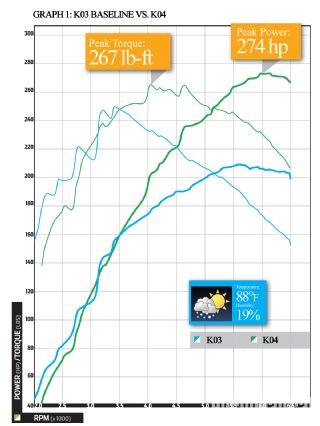 |
Graph 1: K03 Baseline VS. K04
|
Graph 1: K03 Baseline VS. K04
Parts:
• ECS OEM S3 turbo assembly, MSRP: $1,195.94
• ECS OEM S3 injectors set of four, MSRP: $644.08
• ECS Injector O-ring set of four, MSRP: $51.16
• ECS turbo install kit: Downpipe gaskets, studs & nuts, exhaust manifold gasket and locking nuts, Breather gasket, oil drain gasket, oil and water crush washers, MSRP: $34.71
• Autotech Hi-Volume fuel pump kit: Fuel pump piston, fuel pump sleeve, titanium spring retainer, spring retainer keepers, MSRP: $399.95
• Neuspeed K04 billet turbo adapter for existing Neuspeed K03 Hi-Flo turbo discharge kit, upgrade MSRP: $99.95 (Regular MSRP: $339.95)
• Neuspeed K04 P-Chip for existing K03 P-Chip customers: Upgrade MSRP: $200.00 (Regular MSRP: $699.95)
• Additional recommended supplies: Oil filter: $10; VW G12 coolant: $23; five liters of oil: $40
Total Parts MSRP: $2,698.79
Tools: Hose clamp pliers, (10/12/16/17/22/32mm) combination wrench, 5mm & 8mm hex head socket, (10/12/13/16/18/21mm) socket, 3"/6" 3/8 extension, T-25 Safety Torx, T-30 Torx, (M5/M8/M12) triple square, Phillips and flathead screwdrivers, ratchet, extension, penetrating lubricant, non-chlorinated contact cleaner, bench vise
Installation time: 6-8 hours
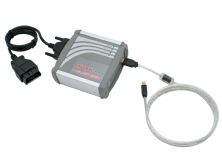 |
The boost graph represents the difference in boost levels between the factory software and Neuspeed flash. Boost and rpm data used in the graph was extracted from the ECU utilizing VCDS HEX-USB+CAN interface and VCDS 10.6 software. Boost data was converted from mBar to psi using a standard conversion formula.
|
The boost graph represents the difference in boost levels between the factory software and Neuspeed flash. Boost and rpm data used in the graph was extracted from the ECU utilizing VCDS HEX-USB+CAN interface and VCDS 10.6 software. Boost data was converted from mBar to psi using a standard conversion formula.
Pros
• OEM parts ensure OEM reliability
• S3 injectors are direct bolt-in, requiring zero modifications to the electrical and fuel systems
• S3 injectors are compatible with the vehicle's computer (no black smoke)
• 100% reversible
• No increase in turbo lag
• No increase in fuel consumption under conservative driving conditions
Cons
• Extra pressure created by the fuel pump can cause extra wear on the pump cam follower, resulting in increased frequency of inspection
Test Notes
The time required to install the OEM S3 turbo and injectors, Autotech Hi-Volume fuel pump kit, and just driving the vehicle to Neuspeed to have the ECU flashed ate away at the day, so we were unable to perform the all the work and subsequent dyno runs on the same day. When we did return with the vehicle three days later to perform the final dyno run, and there was a noticeable 10-degree increase in the outside temperature.
Conclusion
I have driven multiple KO4 upgrades and they have all shown fantastic night-and-day differences vs. stock. Compared to the smaller-power cars (GTI and A3) I've driven, the TT is a totally different animal with a wider track width, shorter wheelbase, wider stock tires, and overall lighter vehicle weight. Post-upgrade, the TT felt much more responsive. I wanted to see if these new driving thrills were artifacts from my relative unfamiliarity with the TT and just inherent in that car's design, so I sought out the owner's opinion of the owner since he was more familiar with the car as a stock daily driver. After taking the car out, the look on his face made it evident was evident that his TT had been revolutionized. From the rapid-fire, excited chatter that gushed from his mouth, I could only make out his last words: "It's so [expletive] fast!"
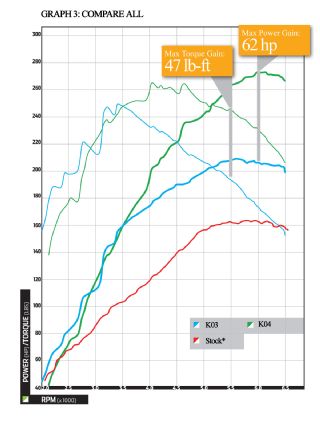 |
*Dyno numbers are from the same vehicle with 3,343 miles and zero modifications.
|
*Dyno numbers are from the same vehicle with 3,343 miles and zero modifications.
Lesson learned-Having a well thought out plan can save time, money, and ultimately your sanity. And now he would be advised to start working out a master plan for suspension and tire upgrades, since his front-drive TT is completely stock in those respects. With all that power, it's in dire need of a stiffer suspension and stickier slicks.

